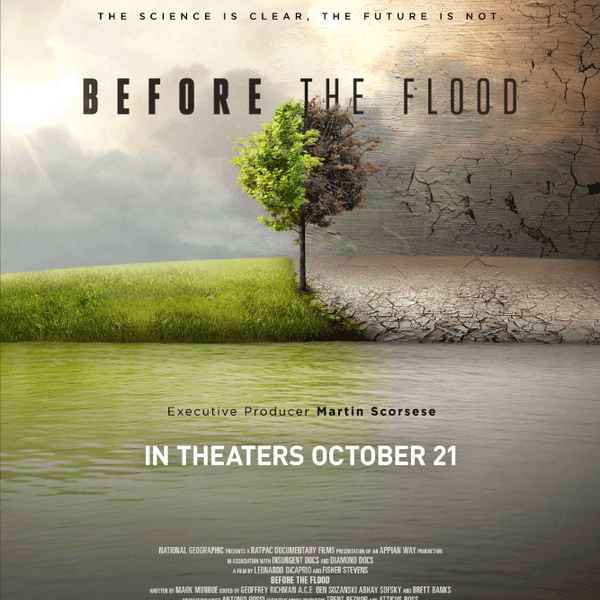Last week, Leonardo DiCaprio (finally) won his first Oscar for his performance in "The Revenant." In his acceptance speech, he brought attention to climate change, as a lack of snow affected the making of the movie. He described climate change as “the most urgent threat to our entire species,” and when you consider the scientific evidence for climate change, his statement is not incorrect. His speech got me thinking about something. We, as a collective society, are aware that climate change is real and is happening. As of October 2015, only 16 percent
of Americans outright deny climate change, and 70 percent believe there is significant evidence indicating a pattern of global warming. This is a drastic increase from 2006 when only 56 percent of Americans believed climate change was occurring. Climate change is a prevalent issue not only in American society, but on a global level. So, why are there so few people in mainstream popular culture talking about climate change?When is climate change discussed in the media?
Whenever climate change is mentioned in the media and popular culture, the discussion does not last very long. Just in the past year, the Discovery documentary "Racing Extinction" was released. When it first came out, people talked about it and thought it was a fantastic way to let people know what impact we as humans are having on our planet. (Side note: If you have not seen it, please watch it. You will not be sorry.) As an optimist, I thought it would be the thing that inspired people to make some changes in order to conserve and protect our world. But to me, it seems as if people have already forgotten about "Racing Extinction."
Think about it: have you heard anyone talk about it recently? In addition, the People’s Climate March (COP21) occurred last year. In an historical agreement, 149 countries decided to reduce emissions in order to keep global temperature rise below two degrees celsius. While COP21 was a great topic of discussion in the media while it was happening, there has been little discussion about the aftermath of this landmark decision. It is very difficult to find anything in the media talking about it. What will happen in the United States? The rest of the world? While there is an agreement to create a low carbon emission future, how will this be accomplished? This is something we as a society need to discuss.Furthermore, much of what is discussed about climate change in media is not quite mainstream. In many cases, people that are not interested in science will not come across these media outlets. There have been plenty of environmental documentaries, including "Chasing Ice," a popular documentary discussing melting glaciers that was released in 2012. In Washington, D.C., the Environmental Film Festival takes place every year in March. I have seen several films here, and I have always come away having learned something new and with a new perspective on the environment. There are also non-fiction books that are not too science-heavy that discuss the implications of climate change, including "Merchants of Doubt" (which I recommend everyone read). This book is eye-opening in regards to the struggles scientists face when presenting facts about which the public is skeptical, including facts about global warming.
Why should we discuss climate change in the mainstream media?
To understand the importance of discussing climate change in mainstream media and popular culture, it is important to understand the basics of climate change. Contrary to the common belief that climate change is a new issue, there has been evidence supporting climate change since the 1970s. In 1977, meteorologist and former head of the National Oceanic and Atmospheric Association (NOAA)
Robert M. White stated that scientists “now understand that industrial wastes, such as carbon dioxide released during the burning of fossil fuels, can have consequences for climate that pose a considerable threat to future society.” Then, in 1995, the Intergovernmental Panel on Climate Change (IPCC) concluded that human activities are affecting climate change.Now, let's break down the science. I assume that most people are at least somewhat familiar with the terms “climate change,” “global warming,” and “greenhouse gases.” What do these terms actually mean? Climate change is the process in which the earth’s weather patterns change over time. Climate is the average of weather patterns over many years, and this pattern appears to be changing as a result of global warming, which is the gradual increase in the earth’s average temperature. This is happening as a result of burning fossil fuels like coal and oil, which release greenhouse gases such as carbon dioxide into the atmosphere. These gases trap heat in the earth’s atmosphere, causing the planet to warm up. Even a small change in earth’s climate and temperature can have drastic effects including increased frequency and intensity of strong hurricanes, sea level rise, and the melting of glaciers. This leads to a disruption of habitat for many organisms, because as temperature increases, the oceans, forests, and tundras become too warm for native species to live there. Problems like sea level rise cause problems for our society, especially where major coastal cities are concerned. Current sea levels are rising at approximately 0.12 inches per year, and if this rate continues, cities like Miami and Washington, D.C. could be under water by the end of the century. Clearly, climate change causes problems not only for human society, but also for different organisms in different habitats around the globe. Now is it clear why this issue needs to be discussed?
So why isn’t there a discussion on climate change in mainstream media?
There is, without doubt, a huge disconnect between science and mainstream popular culture. Mainstream media is not reporting on this major issue with the frequency and intensity it deserves. There are no major recording artists writing songs about climate change, even though there are songs about other pressing issues. At this point, who hasn’t heard all the talk about "Formation," Beyoncé’s new song? Though there are exceptions such as the film "The Day After Tomorrow," there are very few movies that explicitly talk about the results of climate change. In fact, there has been a drastic decrease in the mentions of “climate change” and “global warming” in movies and TV shows since 2007. Prior to this drop, there was a drastic increase in the number of mentions of these terms from 2004 to 2007, largely in part to the release of "The Day After Tomorrow" in 2004. So, why did the numbers drop again? Well, to put it bluntly, we as a society have a short attention span. We get bored with one topic, and want to move on to a newer, more exciting one after a while. Since climate change has been a topic of discussion for some time, people are tired of hearing about it.
Furthermore, a lot of science is not reported on in the mainstream media simply because it can be hard to understand. The terminology and methodology used in scientific papers can be confusing and difficult to understand for people who do not study science, and it can even be difficult for scientists who do not study the particular field in which the paper is written. In fact, only between 20 and 25 percent
of Americans are considered scientifically literate. So, the majority of Americans do not have a great understanding of science, and thus there is a disconnect between the people and the science. It seems that people generally understand that there is significant scientific evidence for climate change and global warming, but there is a lack of understanding of the specifics. People cannot talk about what they do not understand!In conclusion, it is up to us as members of society to show the media what we want to talk about. Not only for our sake, but for the sake of our children, grandchildren, and so on, and for the sake of our environment. Collectively, humans are designed to think short-term rather than long-term, so in the case of climate change, we tend to come up with short-term solutions and then forget about it for a while. However, we need long-term solutions to preserve the health and climate of the planet and this will not happen unless it becomes a societal conversation as a result of exposure in the mainstream media. Climate change is a very real and pressing issue, and in order to solve the problem, we must talk about it.
References:
Dunbar, B. (2011, October 26). What are Climate and Climate Change?
Is sea level rising? (2016, February 29).Leonardo DiCaprio's Oscar Acceptance Speech, courtesy of Latest News Explorer (Facebook)
Merchant, B. (2013, October 10). How Disaster-Hungry Pop Culture Ignored the Biggest Disaster of All.
Oreskes, N., & Conway, E. M. (2010). Merchants of Doubt: How a handful of scientists obscured the truth on issues from tobacco smoke to global warming. New York: Bloomsbury Press.Rosenfeld, L. (2014, September 19). Global warming isn't as much a part of pop culture as you think.
United Nations Conference on Climate Change (COP21)





















